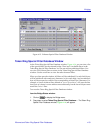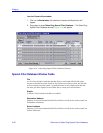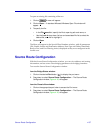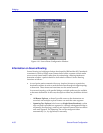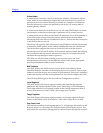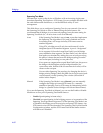
Bridging
4-58 Source Route Configuration
Figure 4-16. Source Route ConÞguration Window
Information on Source Routing
Source Routing is a bridging technique developed by IBM and the 802.5 standards
committee in which a bridge routes frames based on the contents of their media
access control frame header, rather than by maintaining a Þltering database to
determine whether a packet should be forwarded or Þltered. Source Routing
functions as follows:
¥ An end point station transmits discovery (explorer) frames to a particular
destination address in order to seek the best route through a bridged topology
to that node. These frames are broadcast over the entire network.
In a network topology with parallel bridges, multiple paths may be available
to the same destination. In this case, the explorer frame may be further deÞned
as:
- All Routes Explorer, so that all possible routes to the destination are
recorded, and multiple explorer frames can reach the same segment.
- Spanning Tree Explorer (also known as Single Route Broadcast), so that
only one path is possible to a segment (i.e., through a designated bridge in
a Spanning Tree topology), and only one explorer frame will be forwarded
onto each segment. The Spanning Tree can be conÞgured either
automatically (i.e., by algorithm) or manually.




